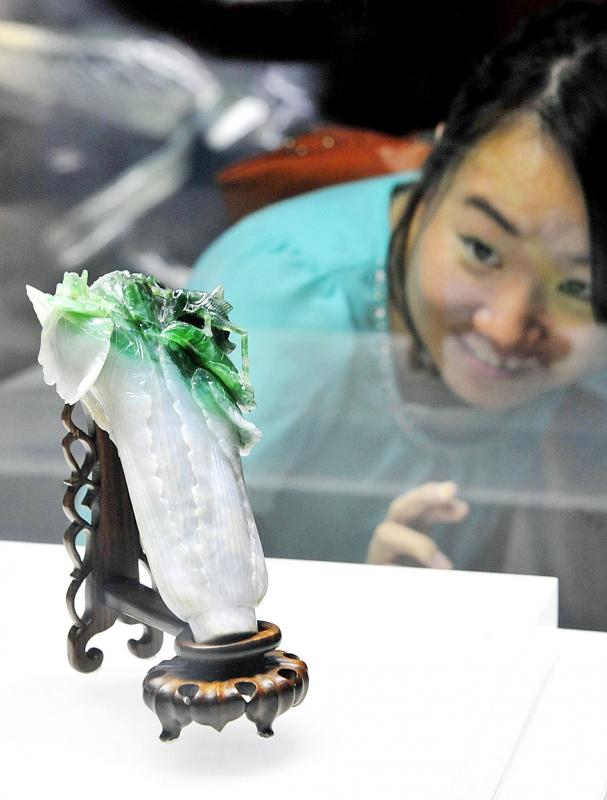A suggestion by a Chinese Nationalist Party (KMT) member that the National Palace Museum’s holdings belong to the party, and therefore its ticket revenues should go to the party, has stirred up a hornets’ nest and triggered criticism from government officials and others.
Chen Li-hsu (陳麗旭), a Tainan delegate to the KMT’s National Congress on Sunday, said that since the Republic of China’s government took major treasures that had belonged to the National Palace Museum in Beijing with it when it went into exile, those items actually belonged to the KMT.
She called on party headquarters to demand their return and for the museum’s ticket money to be turned over to the party as well.

Photo: Pan Shao-tang, Taipei Times
The the Ill-gotten Party Assets Settlement Committee yesterday said that it was “disappointing to see some people still cling to past authoritarian mindsets, believing the KMT owns all the nation’s treasures.”
“During the communist rebellion and the civil war period, the KMT took advantage of the one-party state to contravene the law and devise ways to legitimize its illegal actions. The KMT acquired properties and assets that belonged to the nation and its citizens, amassing a vast wealth that it then controlled,” the committee said in a statement.
“National treasures are not the same as treasures of a political party,” it said.
Pressed by reporters yesterday, KMT Chairman Johnny Chiang (江啟臣) said the proposal was the personal viewpoint of a party delegate and the idea was not discussed during the congress.
However, former KMT chairman Eric Chu (朱立倫) told reporters that he saw Chen’s suggestion as a call to identify with the Republic of China (ROC).
“Of course the treasures of the National Palace Museum belong to Republic of China,” Chu said.
Premier Su Tseng-chang (蘇貞昌) said that “all of the nation’s belongings belong to all 23 million citizens, not to any one party.”
In a Facebook post, Taiwan Statebuilding Party Legislator Chen Po-wei (陳柏惟) raised the possibility that at least one KMT member might have a claim on the museum’s treasures.
When the ROC was founded, the provisional government in Nanjing headed by Sun Yat-sen (孫逸仙) reached an agreement with its rival, the Beiyang government in Beijing of warlord general Yuan Shi-kai (袁世凱), for the national treasures left by the Qing Dynasty to be housed in the Forbidden City, but when warlord Feng Yu-hsiang (馮玉祥) overthrew the Beiyang government, everyone living in the Forbidden City and its contents were kicked out, he wrote.
“If Taiwan were ever to return these treasures, it would be to the Qing emperors’ descendants of the Manchu clan Aisin Gioro, among whom the most prominent is [former KMT secretary-general] King Pu-tsung (金溥聰),” he wrote.
Additional reporting by Chen Chien-chih, Huang Mei-chu and Jason Pan

FOUR DESIGNATED AREAS: Notices were issued for live-fire exercises in waters south and northwest of Penghu, northeast of Keelung and west of Kaohsiung, they said The military is planning three major annual exercises across the army, navy and air force this month, with the navy’s “Hai Chiang” (海強, “Sea Strong”) drills running from today through Friday, the Ministry of National Defense said yesterday. The Hai Chiang exercise, which is to take place in waters surrounding Taiwan, would feature P-3C Orion maritime patrol aircraft and S-70C anti-submarine helicopters, the ministry said, adding that the drills aim to bolster the nation’s offshore defensive capabilities. China has intensified military and psychological pressure against Taiwan, repeatedly sending warplanes and vessels into areas near the nation’s air defense identification zone and across

FORCED LABOR: A US court listed three Taiwanese and nine firms based in Taiwan in its indictment, with eight of the companies registered at the same address Nine companies registered in Taiwan, as well as three Taiwanese, on Tuesday were named by the US Department of the Treasury’s Office of Foreign Assets Control (OFAC) as Specially Designated Nationals (SDNs) as a result of a US federal court indictment. The indictment unsealed at the federal court in Brooklyn, New York, said that Chen Zhi (陳志), a dual Cambodian-British national, is being indicted for fraud conspiracy, money laundering and overseeing Prince Holding Group’s forced-labor scam camps in Cambodia. At its peak, the company allegedly made US$30 million per day, court documents showed. The US government has seized Chen’s noncustodial wallet, which contains

SUPPLY CHAIN: Taiwan’s advantages in the drone industry include rapid production capacity that is independent of Chinese-made parts, the economic ministry said The Executive Yuan yesterday approved plans to invest NT$44.2 billion (US$1.44 billion) into domestic production of uncrewed aerial vehicles over the next six years, bringing Taiwan’s output value to more than NT$40 billion by 2030 and making the nation Asia’s democratic hub for the drone supply chain. The proposed budget has NT$33.8 billion in new allocations and NT$10.43 billion in existing funds, the Ministry of Economic Affairs said. Under the new development program, the public sector would purchase nearly 100,000 drones, of which 50,898 would be for civil and government use, while 48,750 would be for national defense, it said. The Ministry of

SENATE RECOMMENDATION: The National Defense Authorization Act encourages the US secretary of defense to invite Taiwan’s navy to participate in the exercises in Hawaii The US Senate on Thursday last week passed the National Defense Authorization Act (NDAA) for Fiscal Year 2026, which strongly encourages the US secretary of defense to invite Taiwan’s naval forces to participate in the Rim of the Pacific (RIMPAC) exercise, as well as allocating military aid of US$1 billion for Taiwan. The bill, which authorizes appropriations for the military activities of the US Department of Defense, military construction and other purposes, passed with 77 votes in support and 20 against. While the NDAA authorizes about US$925 billion of defense spending, the Central News Agency yesterday reported that an aide of US